初中英语语法精讲精练
初一英语基础语法 精讲精练 03
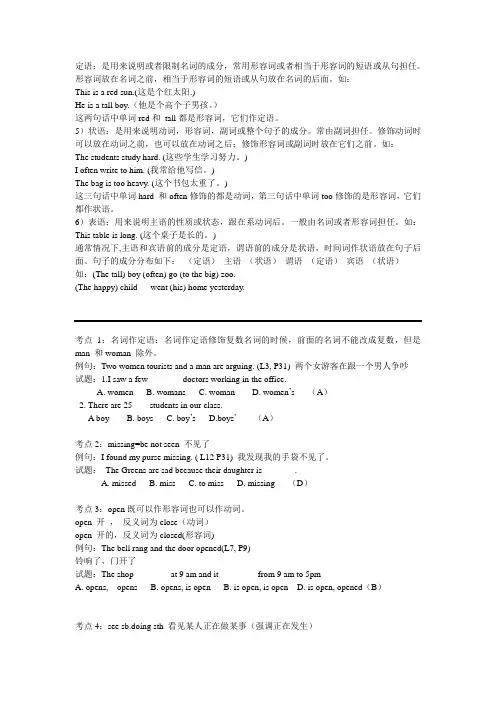
定语:是用来说明或者限制名词的成分,常用形容词或者相当于形容词的短语或从句担任。
形容词放在名词之前,相当于形容词的短语或从句放在名词的后面。
如:This is a red sun.(这是个红太阳.)He is a tall boy.(他是个高个子男孩。
)这两句话中单词red和tall都是形容词,它们作定语。
5)状语:是用来说明动词,形容词,副词或整个句子的成分。
常由副词担任。
修饰动词时可以放在动词之前,也可以放在动词之后;修饰形容词或副词时放在它们之前。
如:The students study hard. (这些学生学习努力。
)I often write to him. (我常给他写信。
)The bag is too heavy. (这个书包太重了。
)这三句话中单词hard 和often修饰的都是动词,第三句话中单词too修饰的是形容词,它们都作状语。
6)表语:用来说明主语的性质或状态,跟在系动词后。
一般由名词或者形容词担任。
如:This table is long. (这个桌子是长的。
)通常情况下,主语和宾语前的成分是定语,谓语前的成分是状语,时间词作状语放在句子后面。
句子的成分分布如下:(定语)主语(状语)谓语(定语)宾语(状语)如:(The tall) boy (often) go (to the big) zoo.(The happy) child --- went (his) home yesterday.考点1:名词作定语:名词作定语修饰复数名词的时候,前面的名词不能改成复数,但是man 和woman 除外。
例句:Two women tourists and a man are arguing. (L3, P31) 两个女游客在跟一个男人争吵试题:1.I saw a few _______ doctors working in the office.A. womenB. womansC. womanD. women’s (A)2. There are 25 ___ students in our class.A boy B. boys C. boy’s D.boys’(A)考点2:missing=be not seen 不见了例句:I found my purse missing. ( L12 P31) 我发现我的手袋不见了。
初中英语语法(精品讲练结合附答案)
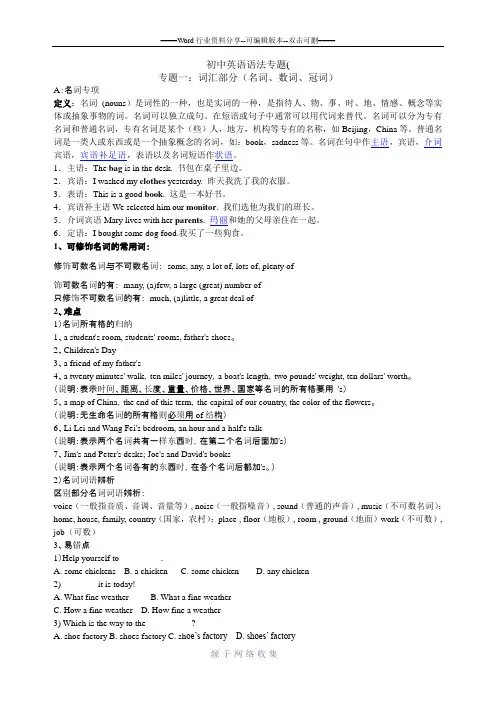
初中英语语法专题(专题一:词汇部分(名词、数词、冠词)A:名词专项定义:名词(nouns)是词性的一种,也是实词的一种,是指待人、物、事、时、地、情感、概念等实体或抽象事物的词。
名词可以独立成句。
在短语或句子中通常可以用代词来替代。
名词可以分为专有名词和普通名词,专有名词是某个(些)人,地方,机构等专有的名称,如Beijing,China等。
普通名词是一类人或东西或是一个抽象概念的名词,如:book,sadness等。
名词在句中作主语,宾语,介词宾语,宾语补足语,表语以及名词短语作状语。
1.主语:The bag is in the desk. 书包在桌子里边。
2.宾语:I washed my clothes yesterday. 昨天我洗了我的衣服。
3.表语:This is a good book. 这是一本好书。
4.宾语补主语We selected him our monitor. 我们选他为我们的班长。
5.介词宾语Mary lives with her parents. 玛丽和她的父母亲住在一起。
6.定语:I bought some dog food.我买了一些狗食。
1、可修饰名词的常用词:修饰可数名词与不可数名词:some, any, a lot of, lots of, plenty of饰可数名词的有:many, (a)few, a large (great) number of只修饰不可数名词的有:much, (a)little, a great deal of2、难点1)名词所有格的归纳1、a student's room, students' rooms, father's shoes。
2、Children's Day3、a friend of my father's4、a twenty minutes' walk,ten miles' journey,a boat's length,two pounds' weight, ten dollars' worth。
初中语法精讲精练.docx
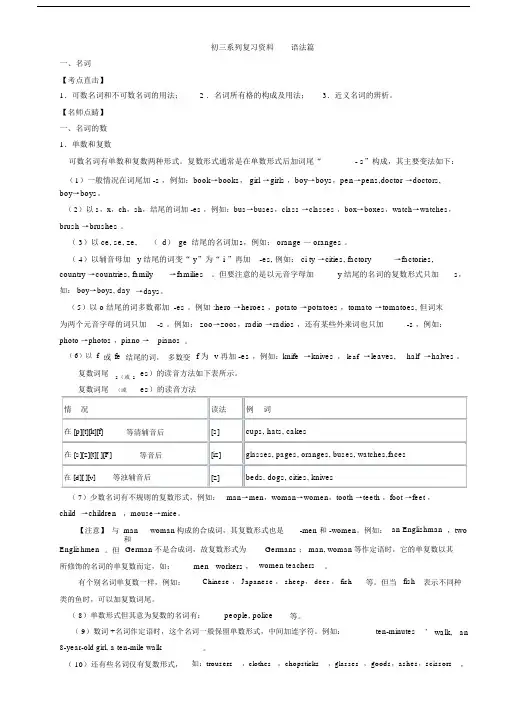
初三系列复习资料语法篇一、名词【考点直击】1.可数名词和不可数名词的用法; 2 .名词所有格的构成及用法;3.近义名词的辨析。
【名师点睛】一、名词的数1.单数和复数可数名词有单数和复数两种形式。
复数形式通常是在单数形式后加词尾“- s”构成,其主要变法如下:(1)一般情况在词尾加 -s ,例如:book→books, girl →girls ,boy→boys,pen→pens,doctor →doctors,boy→boys。
(2)以 s,x,ch,sh,结尾的词加 -es ,例如:bus→buses,class →classes ,box→boxes,watch→watches,brush →brushes 。
( 3)以 ce, se, ze,(d)ge结尾的名词加s,例如: orange — oranges 。
( 4)以辅音母加y 结尾的词变“ y”为“ i ”再加-es, 例如: ci ty →cities, factory→factories,country →countries, family→families。
但要注意的是以元音字母加y 结尾的名词的复数形式只加s,如: boy→boys, day→days。
(5)以 o 结尾的词多数都加 -es 。
例如 :hero →heroes ,potato →potatoes ,tomato →tomatoes, 但词末为两个元音字母的词只加-s 。
例如: zoo→zoos,radio →radios ,还有某些外来词也只加-s ,例如:photo →photos ,piano →pianos。
( 6)以f或fe结尾的词,多数变 f 为v 再加 -es,例如:knife→knives, leaf→leaves,half→halves 。
复数词尾复数词尾s(或s(或es)的读音方法如下表所示。
es)的读音方法情况读法例词在 [p][t][k][f]等清辅音后[s]cups, hats, cakes在 [s][z][t][ ][F]等音后[iz]glasses, pages, oranges, buses, watches,faces在 [d][ ][v]等浊辅音后[z]beds, dogs, cities, knives(7)少数名词有不规则的复数形式,例如: man→men,woman→women,tooth →teeth ,foot →feet ,child→children,mouse→mice。
初一英语基础语法 课堂精讲精练06
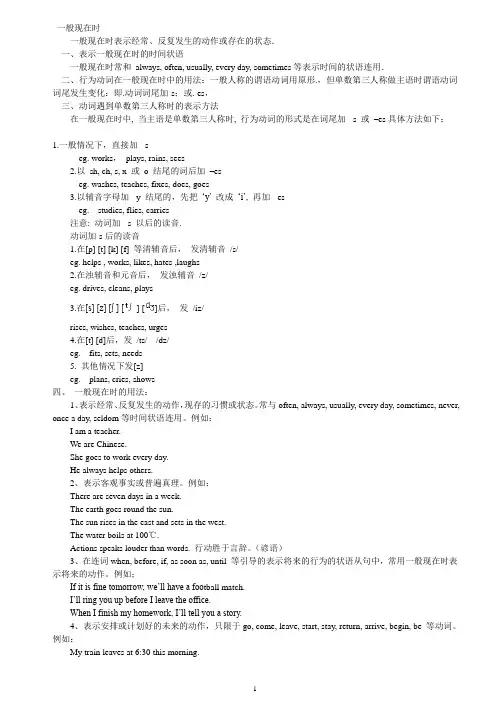
一般现在时一般现在时表示经常、反复发生的动作或存在的状态.一、表示一般现在时的时间状语一般现在时常和always, often, usually, every day, sometimes等表示时间的状语连用.二、行为动词在一般现在时中的用法:一般人称的谓语动词用原形.,但单数第三人称做主语时谓语动词词尾发生变化:即.动词词尾加-s;或.-es,三、动词遇到单数第三人称时的表示方法在一般现在时中, 当主语是单数第三人称时, 行为动词的形式是在词尾加-s 或–es具体方法如下:1.一般情况下,直接加-seg. works,plays, rains, sees2.以sh, ch, s, x 或o 结尾的词后加–eseg. washes, teaches, fixes, does, goes3.以辅音字母加-y 结尾的,先把‘y’ 改成‘i’, 再加-eseg. studies, flies, carries注意: 动词加-s 以后的读音.动词加-s后的读音1.在[p] [t] [k] [f] 等清辅音后,发清辅音/s/eg. helps , works, likes, hates ,laughs2.在浊辅音和元音后,发浊辅音/z/eg. drives, cleans, plays3.在[s] [z] [∫ ] [] []后,发/iz/rises, wishes, teaches, urges4.在[t] [d]后,发/ts/ /dz/eg. fits, sets, needs5. 其他情况下发[z]eg. plans, cries, shows四、一般现在时的用法:1、表示经常、反复发生的动作,现存的习惯或状态。
常与often, always, usually, every day, sometimes, never, once a day, seldom等时间状语连用。
例如:I am a teacher.We are Chinese.She goes to work every day.He always helps others.2、表示客观事实或普遍真理。
初中英语语法知识点精讲+习题+练习(精华版).doc
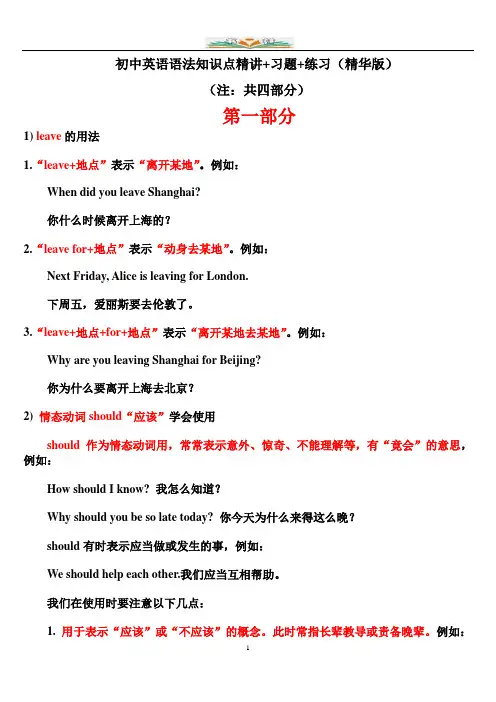
初中英语语法知识点精讲+习题+练习(精华版)(注:共四部分)第一部分1) leave的用法1.“leave+地点”表示“离开某地”。
例如:When did you leave Shanghai?你什么时候离开上海的?2.“leave for+地点”表示“动身去某地”。
例如:Next Friday, Alice is leaving for London.下周五,爱丽斯要去伦敦了。
3.“leave+地点+for+地点”表示“离开某地去某地”。
例如:Why are you leaving Shanghai for Beijing?你为什么要离开上海去北京?2) 情态动词should“应该”学会使用should作为情态动词用,常常表示意外、惊奇、不能理解等,有“竟会”的意思,例如:How should I know? 我怎么知道?Why should you be so late today? 你今天为什么来得这么晚?should有时表示应当做或发生的事,例如:We should help each other.我们应当互相帮助。
我们在使用时要注意以下几点:1. 用于表示“应该”或“不应该”的概念。
此时常指长辈教导或责备晚辈。
例如:You should be here with clean hands. 你应该把手洗干净了再来。
2. 用于提出意见劝导别人。
例如:You should go to the doctor if you feel ill. 如果你感觉不舒服,你最好去看医生。
3.用于表示可能性。
should的这一用法是考试中常常出现的考点之一。
例如:We should arrive by supper time. 我们在晚饭前就能到了。
She should be here any moment. 她随时都可能来。
3) What...? 与Which...?1. what 与which 都是疑问代词,都可以指人或事物,但是what仅用来询问职业。
专题06语法精讲精练(教师版)七年级下册期中考试复习宝典(人教版)含答案
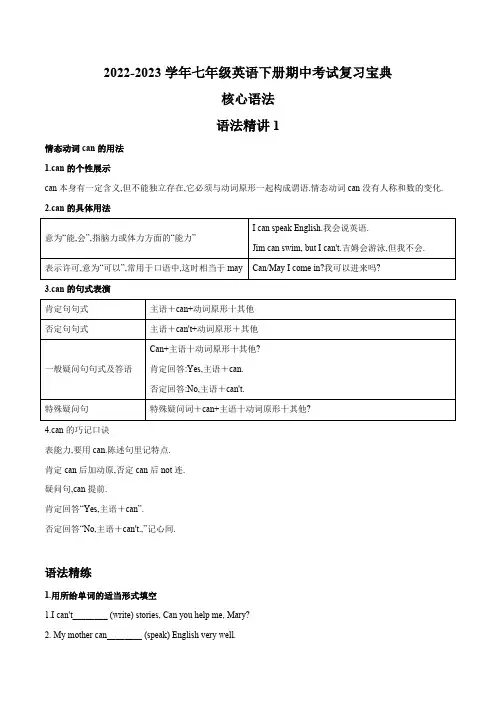
2022-2023学年七年级英语下册期中考试复习宝典核心语法语法精讲1情态动词can的用法1.can的个性展示can本身有一定含义,但不能独立存在,它必须与动词原形一起构成谓语.情态动词can没有人称和数的变化.2.can的具体用法意为“能,会”,指脑力或体力方面的“能力”I can speak English.我会说英语.Jim can swim, but I can't.吉姆会游泳,但我不会.表示许可,意为“可以”,常用于口语中,这时相当于may Can/May I come in?我可以进来吗?3.can的句式表演肯定句句式主语+can+动词原形十其他否定句句式主语+can't+动词原形+其他一般疑问句句式及答语Can+主语十动词原形十其他?肯定回答:Yes,主语+can.否定回答:No,主语+can't.特殊疑问句特殊疑问词+can+主语十动词原形十其他?4.can的巧记口诀表能力,要用can.陈述句里记特点.肯定can后加动原,否定can后not连.疑问句,can提前.肯定回答“Yes,主语+can”.否定回答“No,主语+can't.,”记心间.语法精练1.用所给单词的适当形式填空1.I can't________ (write) stories, Can you help me, Mary?2. My mother can________ (speak) English very well.3.What can your brother________ (do)?4.Miss Lin can't play the piano, but she can________ (sing)well.5.Little Tom can draw, but he________ (can not) dance.答案:1.1.write2.speak3.do4.sing5.can'tII.单项选择1.(2022·百色中考)- ________ you tell us a story in English?-I think I can do it. Let me try.A. NeedB. CanC. ShouldD. Must2.(2022·北京中考)- ________ I take photos here?-Sorry, you can't. It's not allowed in the museum.A. MustB. NeedC. CanD. Will3.We should learn some basic life skills since we________ depend on our parents some day.A. canB. can'tC. mustD. mustn't4. -What kind of music do you like?-I like music that I________ dance to.A. canB. mustC. shouldD. need5.(2022·成都中考)-There is a new art museum in our city. You________ miss it.-Thank you. I won't.A. can'tB. mustC. needn't答案:1.B 考查情态动词辨析.句意:-你能用英语给我们讲一个故事吗?-我认为我能.让我试试.need需要;can能; should应当;must必须.故选B.2.C 考查情态动词辨析.句意:-我能在这里拍照吗?-抱歉,你不能.博物馆不允许拍照.must必须;need需要;can能;will将.故选C.3.B 考查情态动词辨析.句意:既然我们有一天不能依靠父母,我们就应当学会一些基本的生活技能.can 能;can't不能;must必须;mustn't不应该.故选B.4.A 考查情态动词辨析.句意:-你喜欢哪种音乐?-我喜欢能伴着跳舞的音乐.can能;must 必须;should应当;need需要.故选A.5.A 考查情态动词辨析.句意:-我们城市有一个新的艺术博物馆.你不能错过它.-谢谢.我不会的.can't 不能;must 必须;needn't 不必.故选A.III.按要求改写句子(每空一词)1.My father can speak English well.(改为一般疑问句)________ your father________ English well?2.Tom can ride a horse.(改为否定句)Tom________ ________ a horse.3.Mr.Green can do Chinese kung fu.(对画线部分提问)________ ________ Mr. Green________?4.Can Tom and Jim draw pictures?(作肯定回答)Yes, ________ ________.5.play,can,Cindy,well,the,guitar(连词成句)___________________________________________________________________________________________?答案:1.Can;speak2. can't ride3.What can; do4.they can5.Can Cindy play the guitar well语法精讲2一、频度副词定义用来表示频率的副词,叫频度副词.常见的频度副词有:always, usually, often, sometimes, never 等通常在be 动词、助动词或情态动词之后He is always busy.他总是很忙.I will never forget you.我永远也不会忘记你.通常位于实义动词之前They often go swimming.他们经常去游泳.频度副词在句中的位置sometimes 可放在句首、句中或句尾Sometimes she watches TV.她有时看电视.提问how often 意为“多久一次”-How often do you drink milk?-你多久喝一次牛奶?-Every day.-每天.二、一般现在时定义表达现在的状态,主语的性格、能力以及经常或习惯性的动作等He usually takes the bus to school.主语是第三人称单数时,谓语动词用第三人称单数形式他通常乘坐公交车去上学.动词形They watch TV every day.态变化主语不是第三人称单数,谓语动词用原形他们每天都看电视.三、句式结构肯定句句式主语+be/行为动词+其他主语+be+ not+其他否定句句式主语+don't/doesn't+动词原形+其他句式结构Be+主语+其他?一般疑问句句式Do/Does+主语十动词原形十其他?语法精练1.用所给单词的适当形式填空1.Mary usually________ (go) shopping with her mother on Sunday.2. ________ (do)Peter________ (take)a shower in the evening or in the morning?3.Lisa________ (not do) her homework in the evening.4.She never________ (eat) hamburgers for lunch.5.-What time Jack________ (go) to bed?-At 10:30 p.m.答案:1.goes2.Does;take3.doesn't do4.eats5.does;goII.按要求改写句子(每空一词)1.Mr. Green usually goes to work at seven o'clock.(改为一般疑问句)________ Mr. Green usually________ to work at seven o'clock?2.Anna always plays volleyball after school.(改为否定句)Anna________ plays volleyball after school.3.I do my homework at home on weekends.(改为否定句)I________ ________ my homework at home on weekends.4.Lisa sometimes eats bread for breakfast.(对画线部分提问)________ ________ ________ Lisa________ bread for breakfast?5.They usually exercise in the morning.(用he改写句子)________ usually________ in the morning.答案:1.Does;go2.never3.don't do4.How often does; eat5.He;exercises语法精讲3一、how引导的特殊疑问句1.直接由how引导的特殊疑问句询问交通方式How does she get to school?她是如何到校的?询问身体状况How are your parents?你父母身体好吗?询问天气状况How is the weather today?今天天气怎么样?询问程度How do you like the TV show?你觉得这个电视节目怎么样?2.由“how+形容词/副词”引导的特殊疑问句how long意为“多长”,询问时间或物体的长度how far意为“多远”,询问距离how often意为“多久一次”,询问频率how old意为“多大”,询问年龄how many意为“多少”,询问可数名词的数量意为“多少”,询问不可数名词的数量how much意为“多少钱”,询问价格二、交通方式的表达1.take a/the+交通工具take a/the subway/bus/train/boat乘地铁/公共汽车/火车/船动词(短语)2.其他表达方式walk 步行ride a/the/one's bike 骑自行车drive a car 开车1.by+交通工具by bike骑自行车by car/bus/train/subway/boat乘车/公共汽车/火车/地铁/船2.in/on+限定词十交通工具介词(短语)on the bus 乘公共汽车in a car 乘车3.固定表达方式on foot 步行语法精练I.根据句意填写疑问词(组),完成句子1.- _________ does Linda get to school?-She takes the bus.2.- _________ _________ does it take you to get home from work?-About twenty minutes.3.- _________ _________ is it from here?-One hundred kilometers.4.-I walk to school. _________ about you, Jane?-I ride my bike.5.- _________ _________ people are there in the photo?-Six.答案:1.How2.How long3.How far4.How5.How manyII.单项选择1.(2022·安徽滁州凤阳博文国际学校期末) I usually_________ to the bus stop, and then go to school by bus.A. by bikeB. on my bikeC. in my bikeD. ride my bike2.- _________ does Bob usually go to work?-He usually rides his bike.A. WhatB. HowC. WhereD. Who3.(2022·浙江杭州萧山城区期中)-Excuse me. _________ is it to the East Station?-About half an hour by taxi.A. How manyB. How longC. How farD. How old4.- _________ do you visit Uncle Tom?-Once a week.A. How longB. How oftenC. How soon答案:1.D 考查动词短语的用法.句意:我通常骑自行车到公交站,然后坐公交上学.I后面需要一个动词短语.故选D.2.B 考查疑问词辨析.由答语“他通常骑自行车”可知,问句是询问上班的交通方式.故选B.3.C 考查疑问词组辨析.句意:-打扰一下.到东站有多远?--坐出租车大约半个小时.how many多少;how long 多久;how far多远;how old几岁.故选C.4.B 考查特殊疑问词组辨析.由答语“每周一次”可知,问句是询问“你多久拜访一次汤姆叔叔”.提问频率用how often.故选B.语法精讲4一、祈使句1.祈使句的定义表示请求、命令、建议、警告、劝说等的句子叫祈使句.在祈使句中,肯定句一般以动词原形开头,通常省略主语you;否定句在动词原形前加don't.2.祈使句的句式结构祈使句句式肯定句句式否定句句式P型:Please十动词原形十其他Please stand up.Please don't stand up.V型:动词原形十其他Look at the blackboard.Don't look at the blackboard.L型:Let+宾语十动词原形+其他Let her go.Don't let her go./ Let her not go.B型:Be+表语Be careful.Don't be late for class!N型:No+名词/动名词/No photos! No parking!3.祈使句用法口诀祈使句,祈使句,请求、命令或建议.主语是you常省去,动词原形开头记.否定形式要注意,句首要把don't加.要讲客气用please,句首、句末没关系.二、must和have to辨析1.两者均意为“必须”.must更强调说话者的主观意愿,have to强调客观需要,意为“不得不”.2.must一般只表示现在,没有人称和数的变化;而have to则可以用于不同的时态,有人称和数的变化.3.两者的否定式含义大不相同.mustn't 意为“不准;禁止”,而don't have to意为“不必”.【注意】以must开头的一般疑问句,其肯定回答用must;否定回答用needn't或don't have to.语法精练1.用所给单词的适当形式填空1. _________ (finish)your homework first.2. _________ (not come) to the zoo before 6 o'clock, please.3.Please_________ (be) quiet in the room.4.No_________ (swim) in the river!5.They have to_________ (do) their homework when they get home.答案:1.Finish2.Don't come3.be4.swimming5.doII.单项选择1.(2022·广西河池凤山期末) _________ play the guitar here, Jack. It's too noisy.A. Can'tB. NoC. Don'tD. Doesn't2.(2022·湖南郴州期末)-Jack, _________ leave the dirty dishes in the kitchen!-Sorry, Mom.A. can'tB. doesn'tC. don't3.(2022·湖南株洲攸县期末) _________ run in the hallway, children!A. Don'tB. NotC. Can't4.(2022·江西宜春期末)-Can I go out with Lisa, Dad?-Yes, but you_________ come back home before five o'clock, You'll have an art lesson then.A. mustB. canC. mustn'tD. can't5.(2022·浙江宁波海曙区期中)We_________ be noisy in the library and we_________ keep the books clean.A. have to; mustB. must; can'tC. have to; can'tD. can't; have to答案:1.C 考查祈使句.句意:不要在这里弹吉他,杰克.太吵了.祈使句的否定句是“Don't+动词原形”.故选C.2.C 考查祈使句.句意:-Jack,不要把脏餐具留在厨房里.-抱歉,妈妈.祈使句的否定句是“Don't+动词原形”.故选C.3.A 考查祈使句.句意:孩子们,不要在走廊里跑!祈使句的否定句是“Don't+动词原形”.故选A.4.A 考查情态动词辨析.句意:-爸爸,我可以和丽莎出去吗?--是的,但你必须在五点钟之前回家.那时你要上一节艺术课.故选A.5.D 考查情态动词辨析.句意:我们不能在图书馆里吵闹,我们必须保持干净.can't不能;have to不得不.故选D.语法精讲5一、形容词形容词修饰名词,用以说明事物或人的性质和特征.它通常在句子中作定语、表语或宾语补足语等.句中成分说明示例定语一般修饰名词,置于名词之前She is a happy girl.她是一个幸福的女孩.置于系动词(be, look, feel, sound等)之The girl is beautiful.这个女孩很漂亮.表语后,可以被程度副词very, too等修饰宾语补足语说明宾语的状态、特征等What makes you so happy?什么使你这么开心?二、特殊疑问句1.定义及答语特殊疑问词引导的疑问句叫特殊疑问句,其结构为“特殊疑问词十一般疑问句?”回答特殊疑问句不能用yes或no.回答时要针对具体情况来作出回答.2.特殊疑问词特殊疑问词分为两类:疑问代词和疑问副词,其用法归纳如下:Who意为“谁”,用于对主语(人称代词)进行提问Whom意为“谁”,用于对宾语(人称代词)进行提问When意为“何时”,用于对时间进行提问Where意为“哪里”,用于对具体地点进行提问How意为“怎样”,用于对方式进行提问Why意为“为什么”,用于对原因进行提问What意为“什么”,用于对某人的名字、职业等进行提问Which用于对“哪个;哪些”进行提问【注意】由why引导的特殊疑问句,一般要用because引导的从句来回答.because是连词,作“因为”讲,其后要接一个句子来陈述理由.例如:-Why does she do that?-她为什么要那样做?-Because she wants to help the person.-因为她想帮助那个人.语法精练I.单项选择1.(2022·江西赣州兴国期末)-Don't be_________. Jack! Help me clean the room right now!-OK, Mom.A. afraidB. lazyC. shyD. quiet2.(北京海淀区期中) _________ is Jenny from?-She comes from the US.A. WhatB. WhoC. WhenD. Where3.(2022·广西北海期末)- _________ do you like this book?-Because it's exciting.A. WhyB. WhatC. HowD. Who4.(2022·福建莆田期末)My brother is very_________. He can always make new things.A. smartB.busyC. kind5.- _________ was the car invented?-It was invented in 1885.A. WhenB. WhichC. WhoD. Where答案:1.B 考查形容词辨析.句意:-不要懒惰,杰克!立即帮助我清扫房间!-好的,妈妈.afraid害怕的;lazy懒惰的; shy害羞的;quiet安静的.故选B.2.D 考查特殊疑问词辨析.由答语“她来自美国”可知,问句是询问珍妮来自什么地方.对地方提问需用where.故选D.3.A 考查疑问词辨析.句意:-你为什么喜欢这本书?-因为它是令人兴奋的.why为什么;what什么;how怎样;who谁.故选A.4.A 考查形容词辨析.句意:我弟弟很聪明.他总是能制作新东西.smart聪明的;busy忙碌的;kind和蔼的.故选A.5.A 考查特殊疑问词辨析.由答语中的“在1885年”可知,问句是询问“汽车是什么时候被发明的”.对时间提问用when.故选A.II.对画线部分提问(每空一词)1.Linda doesn't like math because it's difficult._________ _________ Linda_________ math?2.I can see some books on the table._________ can you_________ on the table?3.Mr. Green often goes to work at 7:30 in the morning._________ _________ Mr. Green often go to work?4.Lions are from South Africa._________ _________ lions from?5.Most students go to school by bus._________ _________ most students go to school?答案:1.Why doesn't; like2.What;see3.When does4.Where are5.How do。
初中英语语法精讲精练
• Shanghai is a big city .(上海是个大城市)
句子成分
3、构词法:
• 3、转换法: • (1)形容词→动词,如:dry(干燥的)→dry(弄干), clean(干净
的)→clean(打扫,弄干净), 等等。 • (2)动词→名词,如:look, walk, rest, work, study, swim, go,
talk等等。 • (3)名词→动词,如:hand(手)→(传递),face(脸)→(面对)等
• 8、介词(prep.): 表示它后面的名词或代词与其他 句子成分的关系。如in, on, from, above, behind.
• 9、连词(conj.): 用来连接词、短语或句子。如and, but, before .
• 10、感叹词(interj..)表示喜、怒、哀、乐等感情。如: oh, well, hi, hello.
初中英语语法精讲精练
初中英语语法精讲精练
一、词类、句子成分和构词法:
• 1、词类: • 英语词类分十种: • 名词、形容词、代词、数词、冠词、动词、
副词、介词、连词、感叹词。
词类
• 1、名词(n.): 表示人、事物、地点或抽象概念 的名称。如:boy, morning, bag, ball, class, orange.
用名称。 专有名词中实词的第一个字母要大写。 如: Beijing, Tom, the People‘s Republic of China(中华人民共 和国) 专有名词如果是含有普通名词的短语,则必须使用 定冠词the。如:the Great Wall(长 城) 姓氏名如果采用 复数形式,则表示该姓氏一家人(复数含义),如:the Greens( 格林一 家人)。 • 2、普通名词是许多人或事物的共有名称。如:pupil, family, man, foot. 普通名词又分为可数名词和不可数名 词。 ▲可数名词是可以用简单的数词进行计数的名词, 如: box, child, orange; ▲不可数名词是不可以用简单 的数词进行计数的名词。如:water, news, oil, population, information .
初中英语语法精讲精练
12.I have seven _________ (lesson) every day. lessons 13.We like __________ (collect) stamps after school. collecting 14.Kate _________ (like) playing the violin. likes 15.What does Sam usually _________ (do) on Saturdays? do well 16.Tom can do exercise ________ (good). any 17.Are you taking _________ (some) medicine[medisin]?医学 医学 got 18.I've _________ (get) a nice dress. are _______ 19.It's five o'clock. The students ____ cleaning (clean) the classroom. do 20.What do you usually _______ (do) in the evening? do Sometimes I ________ (do) my homework. Sometimes I ________ (watch) TV. watch Does buy 21.______ he _______ (buy) food in the supermarket doesn't every week? No, he ________. teaches 22.My mother is a teacher. She _________ (teach) in a primary school.
初中英语语法讲解及练习
初中英语语法【名词】1.名词的可数与不可数可数名词指表示的人或事物可以用数来计量,它有单数与复数两种形式。
不可数名词指所表示的事物不能用数来计量。
物质名词与抽象名词一般无法用数目来统计,都是不可数名词。
不可数名词前一般不能用冠词a、an来表示数量,没有复数形式。
要表示“一个……”这一概念,就须加a piece of这一类短语。
要注意许多名词在汉语里看来是可数名词,在英语里却不可数。
如:chalk,paper,bread,rice,grass,news等。
2.名词的复数(1)规则变化A.一般情况下加-s。
B.以s, x, ch, sh, 结尾的加-es。
如:bus---buses,box---boxes,watch---watches,brush---brushesC.以辅音字母加y结尾的改y为i再加-es。
如:city---cities,country---countriesD.以f,fe结尾的,去掉f或fe,变成v再加-es。
(2)不规则变化A.元音发生变化。
如:man---men,woman---women,foot---feet,tooth---teeth,mouse---miceB.词尾发生变化。
如:child---childrenC.单、复数同形。
如:fish---fish,Japanese---Japanese,Chinese---Chinese,sheep---sheep3.物质名词(不可数名词)量的表示方法(1)用much,a little,a lot of等表示(2)用容器表示a bowl of rice,a glass of water,a cup of tea,a piece of,orange,two glasses of milk,two pieces of paper 另外,大家应注意:单数集合名词作主语时谓语动词“数的”变化:单数集合名词如class, police, family, school, group, team 等。
新目标七年级英语语法精讲精练与专项练习(全)
新目标七年级英语语法精讲精练与专项练习(全)1.中文名与英文名:【中文名】由两部分组成-----姓和名,如:wanglili一,sunwukong.中文名用汉语拼音写成,姓和名要分开写,开头字母都大写。
英文名与中文名顺序恰好相反,名字在前,姓在后。
如:jimalangreenfirstnamemiddlenamelastname||givenname(教名)familyname(姓氏)[英文名称]一般由三部分组成:名字和中间名和尾名(lastname),其中firstname和middlename是后起的名字,也叫givenname (教名)。
lastname是家族沿用的名字,也叫familyname.【乔学苗记】第一个姓氏,然后第一个名字,中文名字,直接用汉语拼音写,姓和名要分开写,开头大写才能行。
英文名,大不同,前面名字后面姓,首名称呼最常用,若要表示受尊重,小姐先生太太。
女士用在姓氏之前[专项演练]()1.myfullnameisjerryharrypotter.myfirstnameis_andmyfamilynameis_.a、杰瑞·哈里布。
杰瑞波特克。
波特杰里()2.i’mtomgreen.youcancall(称呼)me_a、古墓先生。
格林先生。
绿色2.物主代词:在英语中,表示“你的,我的,他的,她的,它的,你具有“你的、我们的和他们的”意思的代词形式被称为所有格代词。
所有格代词是代词的所有格形式,用来表示物品的所有权关系,即某物属于某人。
人称主格代词宾主代词第一人称我的第二人称你,你的第三人称他/她。
我是学生。
我是一名学生。
sheismysister.她是我的妹妹。
heisinchinanow.他现在在中国。
【物主代词】分为两类,形容词性物主代词作用相当于形容词,在句用于修饰名词,如myname、yourphonenumber、hisrule、herschoolbag【巧学妙记】主格代词作主语,把它放在句子的开头,表明是谁,i,we,you,he,she,it,they,一共七个来打擂。
- 1、下载文档前请自行甄别文档内容的完整性,平台不提供额外的编辑、内容补充、找答案等附加服务。
- 2、"仅部分预览"的文档,不可在线预览部分如存在完整性等问题,可反馈申请退款(可完整预览的文档不适用该条件!)。
- 3、如文档侵犯您的权益,请联系客服反馈,我们会尽快为您处理(人工客服工作时间:9:00-18:30)。
David一名词的分类:1.名词可以分为专有名词和普通名词,专有名词是某个(些)人,地方,机构等专有的名称,如Beijing,China等。
普通名词是一类人或东西或是一个抽象概念的名词,如:book,sadness等。
普通名词又可分为下面四类:1)个体名词:表示某类人或东西中的个体,如:gun。
2)集体名词:表示若干个个体组成的集合体,如:family。
3)物质名词:表示无法分为个体的实物,如:air。
4)抽象名词:表示动作、状态、品质、感情等抽象概念,如:work。
二,名词变复数:2 名词复数的不规则变化1)child---children foot---feet tooth---teeth mouse---mice man---men woman---women注意:由一个词加man 或woman构成的合成词,其复数形式也是-men 和-women,如an Englishman,two Englishmen。
但German不是合成词,故复数形式为Germans;Bowman是姓,其复数是the Bowmans。
2)单复同形,如deer,sheep,fish,Chinese,Japanese ,li,jin,yuan,two li,three mu,four jin等。
但除人民币的元、角、分外,美元、英镑、法郎等都有复数形式。
如:a dollar, two dollars; a meter, two meters。
3)集体名词,以单数形式出现,但实为复数。
例如:people police cattle 等本身就是复数,不能说a people,a police,a cattle,但可以说a person,a policeman,a head of cattle, the English,the British,the French,the Chinese,the Japanese,the Swiss 等名词,表示国民总称时,作复数用,如The Chinese are industries and brave.中国人民是勤劳勇敢的。
4)以s结尾,仍为单数的名词,如:a. maths,politics,physics等学科名词,一般是不可数名词,为单数。
b. news 为不可数名词。
c. the United States,the United Nations 应视为单数。
The United Nations was organized in 1945. 联合国是1945年组建起来的。
d. 以复数形式出现的书名,剧名,报纸,杂志名,也可视为单数。
例如:"The Arabian Nights" is a very interesting story-book. 《一千零一夜》是一本非常有趣的故事书。
5)表示由两部分构成的东西,如:glasses (眼镜)trousers,clothes等,若表达具体数目,要借助数量词pair(对,双);suit(套); a pair of glasses; two pairs of trousers等。
6)另外还有一些名词,其复数形式有时可表示特别意思,如:goods货物,waters水域,fishes(各种)鱼。
物质名词和抽象名词可以借助单位词表一定的数量,如a glass of water 一杯水/ a piece of advice一则建议。
5. 定语名词的复数名词作定语一般用单数,但也有以下例外。
1) 用复数作定语。
例如:sports meeting 运动会students reading-room 学生阅览室talks table 谈判桌the foreign languages department 外语系2)man, woman, gentleman等作定语时,其单复数以所修饰的名词的单复数而定。
例如:men workers women teachers gentlemen officials3)有些原有s结尾的名词,作定语时,s保留。
例如:goods train (货车)arms produce武器生产customs papers 海关文件clothes brush 衣刷4)数词+名词作定语时,这个名词一般保留单数形式。
例如:two-dozen eggs两打鸡蛋 a ten-mile walk 十英里路two-hundred trees 两百棵树 a five-year plan.一个五年计划一、不定冠词的用法:1、泛指人或事物的类别,相当于any, 如: A hammer is tool. A steel worker makes steel.2、泛指某人或某物。
A boy is waiting for you. There is a book on your desk.3、表one或every。
We work 8 hours a day. I go home twice a month.4、表示the same 的意思。
Birds of a (= the same) feather flock together; people of a kind come together.5、用在不可数名词前a)(用在物质名词前)一种,一份 A large coffee for me. It was a wonderful tea.b)(用在某些表示风、雨等的名词前)It was clear daylight now and a fine rain was falling. There is a cold wind this morning.c)(用在抽象名词前)一种That is a great disappointment. It’s a pleasure to work with you.6、(用在某些专有名词前)某个叫…的人,一张…的画,一个象…的人等。
I saw a Mrs. Smith on the 12th at 2:00. He had a Van Gogh in the dining-room.What a strange London they saw! He’s a living Lei Feng.7、用于某些固定词组中。
a few, a little, a good many, a lot of, all of a sudden, as a rule, have a cold等。
8、在元音音素开头的名词前应用an, 如an apple, an English book。
要以发音为准,并非以元音字母而定。
如a university, an hour, an “h”, an X-ray examination.二、定冠词的用法。
1、表特定的或上文提到的人或物。
The boy likes the film. Shut the door, please. The old poor peasant has a son. The son is a model worker.2、表示世界上独一无二的东西。
the earth, the moon, the stars, the sun(但space前不用)3、用在序数词、形容词或副词最高级前。
the second, the tallest, the last, the first.4、用在由普通名词构成的国家、党派或组织机构等的专有名词前。
the United States; the People’s Republic of China;the Communist Party of China;the Chinese People’s Liberation Army;the No. 15 Middle School; the department of Education.5、用在某些建筑物名称前。
The Great Hall of the People; the Monument to the People’s Heroes;the Great Wall;the Capital Theatre; the Space Museum; the Peace Hotel。
6、用在江河海洋,山脉群岛,海峡海湾等专有名词前。
The Changjiang River, the Red Sea, the Dabie Mountains, the English Channel, the Taiwan Straits, the Persian Gulf。
7、用在报纸、会议、条约等专有名词前。
the People’s Daily(但:China Daily)the New York Times, the 15th Party Congress, the Geneva Agreement8、用在方位名词前,某些习惯短语中或结构搭配中。
on the left, in the east, in the morning, on the other hand, in the end, hit sb on the head, catch sb by the arm9、用在形容词前表一类人。
the poor, the dead, the young, the rich, the wounded.10、用在双方都知,不言而喻的名词前。
Give me the book. Who’s the man?11. 用在姓氏复数前表示一家人或夫妇二人。
the Smiths, the Greens, the Wangs, the Turners12. 用在单数可数名词前泛指某类人或物(指整个一类)。
The horse is a useful animal.The computer was invaded not long ago.13. 指世纪的年代。
in the 1890’s或in the 1890s14.用在表示乐器的名词前。
play the piano (the guitar, the violin, the flute)15. 用在某国语言前,构成the … language的形式。
The English language is very widely used all over the world.如果单用国家变来的语言名词形式,则不用the。
Chinese has the largest number of speakers in the world.16.用于“论(或按)……计”之类的意思。
He got paid by the hour. They sell the cloth by the meter.三.零冠词的场合。
